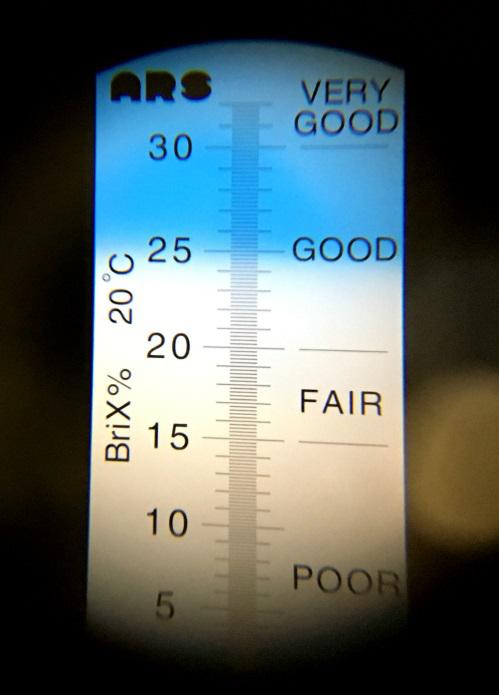| Click here to view this page in your web browser. |
|
ARS Update Animal Reproduction Systems Newsletter |
|
Dear Valued ARS Customers,
The 2017 Breeding Season is now upon us and new foals are arriving every day. This email
will focus on the importance of Colostrum and how to measure it immeediately after foaling
to determine it's quality.
ARS Equine Colostrom Refreactometer
One drop of colostrum is all it takes to make a difference in a foal’s life
Advantages of the ARS Colostrum Refractometer:
§ Rapid evaluation of colostrum quality
§ Accurate, repeatable
§ Stall-side testing
§ Easy to use and easy to clean
§ Colostrum quality scale provided within optics
§ Cost effective technique for proactive prevention of passive transfer
failure in foals
§ University tested
Colostrum - The Elixir of Life
Colostrum is the thick, sticky yellow fluid produced by the mammary gland of the mare
during the last few weeks of pregnancy. Colostrum is rich in antibodies that are critically
important for immune protection of the newborn foal. Foals are born without any antibody
protection and are entirely dependent on antibodies from colostrum for protection against
infection during the early neonatal period.
Most foals will stand within one hour and begin to nurse within 2 hours after birth.
Specialized enterocyte cells in the small intestine engulf droplets of colostrum and transfer
the antibodies into the lymphatics and subsequently into the bloodstream. The capacity of
the small intestine to absorb and transfer antibodies is greatest during the first 6 to 8 hours
after birth, declines substantially after 12 hours and completely ceases within 24 hours after
birth. Foals need to ingest a minimum of 1 to 2 liters of good quality colostrum within the
first few hours of life to acquire sufficient antibodies to protect against infectious diseases.
Failure of Passive Transfer
Failure of passive transfer (FPT) occurs in 10 to 20 % of newborn foals. Inadequate passive
transfer of antibodies from colostrum puts a newborn foal at significant risk of infectious
diseases early in life. The most common causes of FPT are premature lactation, poor
quality colostrum, failure of colostrum production, inability or lack of desire by the foal to
nurse, prematurity, dysmaturity, foal rejection by the mare and failure to absorb antibodies
that are ingested.
Evaluation of Colostrum
Evaluation of colostrum quality immediately after foaling is one of the best ways to
determine the potential for FPT and allow for subsequent institution of management
procedures to provide immune protection to the newborn foal. Qualitative assessment of
colostrum can easily and rapidly be performed using a Brix refractometer. A single drop of
colostrum collected from the mare immediately after foaling is placed on the prism of the
refractometer. The daylight plate is closed, which spreads the sample evenly across the
prism. The refractometer is held in the direction of a light source and the amount of light
refraction is evaluated on a scale as a percentage score. Colostrum with a low
concentration of antibodies will have a low percentage score, while colostrum with a high
concentration of antibodies will have a high percentage score. Refractometer evaluation of
equine colostrum is highly repeatable and highly correlated with IgG antibody levels
measured by the radial immunodiffusion (RID) assay (Table 1).
|

|
|

|
|
Advantages of Colostrum Evaluation
Successful passive transfer of antibodies from the mare to her foal depends on
quality and quantity of colostrum, timing of the ingestion of colostrum, health
status of the foal and absorption of antibodies by the small intestine.
Assessment of colostrum quality evaluates only one component of the passive
transfer process. However, if it can be determined that the quality of the
colostrum produced by a mare is inadequate, the foal can be supplemented
early in life with additional frozen-thawed colostrum of good quality.
Refractometer evaluation of colostrum is valuable in determining the quality of
colostrum to be harvested and stored in a colostrum bank. Owners and farm
managers are strongly encouraged to maintain a supply of equine colostrum
frozen at -20° C. A volume of 250 to 500 mls of colostrum may be safely
harvested from a postpartum mare without adversely affecting passive transfer
to her own foal. The best colostrum donors are healthy mares that have had
one or more foals previously and that have been vaccinated 4 to 6 weeks prior
to foaling. Ideally, the colostrum should have a refractometer score of 25 % or
higher and be tested for the presence of anti-RBC antibodies, to prevent the
possibility of neonatal isoerythrolysis or jaundice foal syndrome. Frozen
colostrum can be safely stored for up to 1 to 2 years.
ARS continues to develop new and innovative products, meeting the needs and
technology changes of the equine industry. Our engineering department works
cooperatively with leading universities, private laboratories, and successful
horsemen. All of our products are tested individually or by batch sampling to
ensure that our customers receive high quality, biologically safe, and easy to
use products. Our friendly and knowledgeable staff welcomes your inquiries
Please visit www.arssales.com/equine for additional information.
For more information call us at 1-800-300-5143 or visit our web site at
Comments/questions/suggestions - e-mail them to sales@arssales.com
To unsubscribe from this list simply reply to this message or send an E-
mail to: unsubscribe-ars-update@listbox.com
|